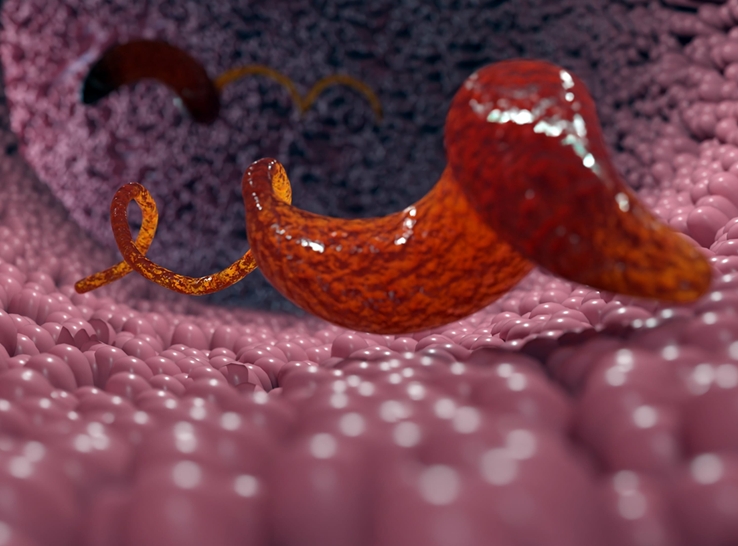Using the antibiotic bacitracin in poultry poses virtually no risk of an untreatable human infection from antimicrobial-resistant bacteria originating from chicken and turkey products, reports Randall Singer, DVM, PhD, University of Minnesota.
This assessment comes more than 50 years after bacitracin was first approved for US animal feed.
Today, bacitracin is widely used in broiler feed to aid in the prevention and control of necrotic enteritis in chickens caused or complicated by Clostridium spp. and is used as an aid in the control of transmissible enteritis in growing turkeys.
A water-soluble version is approved for controlling necrotic enteritis in broiler and replacement chickens, as well as transmissible enteritis in growing turkeys.
“The World Health Organization list puts bacitracin as medically important because at least one country in the world requires a bacitracin prescription for use, even topically, in humans,” Singer said
“In the US, however, bacitracin is characterized as a ‘not medically important antimicrobial’ by the Food and Drug Administration,” he added.
Singer and his colleague Timothy Johnson, PhD, both professors in the university’s Department of Veterinary and Biomedical Sciences, were tasked with conducting a quantitative risk assessment of bacitracin, also known as bacitracin methylene disalicylate.
Singer discussed the findings in a presentation at the 2024 International Poultry Scientific Forum.
Assessing bacitracin resistance
“The objective was to estimate the potential risk in the US of a human infection with antimicrobial-resistant bacteria, namely Enterococcus faecalis and Enterococcus faecium derived from chicken and turkey products as a result of bacitracin usage in US broiler chickens and turkeys,” Singer explained.
“But linking the on-farm use of bacitracin to potential human-health risks is not easy. We don’t monitor bacitracin resistance in any of the bacteria we track. Second, bacitracin itself really isn’t relevant to human health, especially in the US.
“In fact, bacitracin is not used to treat enterococcal infection in people,” he added.
The assessment began by determining 182,000 healthcare-associated enterococcal infections that occur annually in the US. The researchers then used data from the National Healthcare Safety Network to determine that about two-thirds of the cases were faecalis related and one-third faecium.
“Attribution estimates were generated by analyzing whole-genome sequencing data and then comparing the resistance-gene overlap among host species with random forest classification models,” Singer explained.
They found about 60% of E. faecalis and E. faecium derived from poultry possessed bacitracin resistance based on the presence of the bcrABDR gene locus — the location on the chromosome where a gene is found. But very few human-derived isolates possess this trait.
Negligible annual risk
“The final piece is, though, how many of these isolates would actually fail to be treated in a human hospital based on the resistance genes they possess?” Singer said.
The answer is nearly zero, he reported. Enterococcal infection in humans is treated with antibiotics such as vancomycin, linezolid and daptomycin — not bacitracin.
“There is not a single poultry-derived faecalis isolate or a faecium isolate in the FDA’s National Antimicrobial Resistance Monitoring System database with resistance to vancomycin or linezolid,” he added. “
“The risk-maximized model estimated the number of antimicrobial-resistant E. faecalis and E. faecium cases per year that might resist therapy due to bacitracin use in poultry as 0.86 and 0.14, respectively,” Singer explained.
“This translates to an annual risk estimate for E. faecalis of less than 1 in 350 million and for E. faecium of less than 1 in 2 billion for members of the U.S. population, representing a negligible risk.”
In conclusion, Singer said that the populations of faecalis and faecium originating from poultry do not look anything like those originating from people. “These are totally different sets of populations of isolates,” he added.
“Plus, the bcrABDR-positive poultry-isolate collection rarely carry resistance genes that are going to affect human therapy. And this is after 50 years of use of bacitracin in poultry.
“These results indicate that there is a high probability that the use of bacitracin according to label instructions in US poultry presents negligible risk to human health,” Singer added.
The report comes at a time when some US producers and restaurant chains are rethinking the sustainability of “no-antibiotics-ever” production schemes and adopting new policies permitting the use of non-medically important antibiotics under veterinary supervision.





